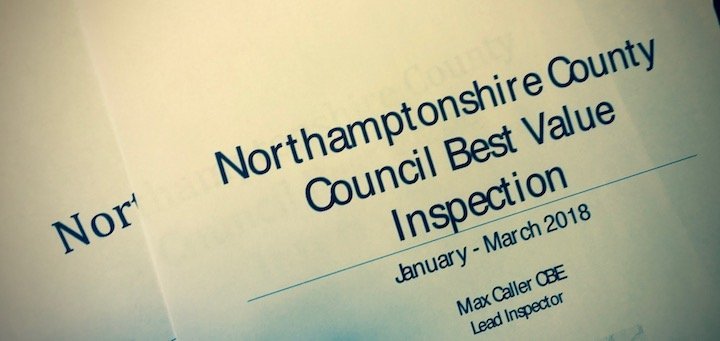A government inspector has delivered a withering assessment of senior officers at Northamptonshire County Council (NCC), as well as the council’s attempts at restructuring.
Max Caller, who led a team sent in by communities secretary Sajid Javid due to concerns over financial management, also recommended the council be split into two new unitary authorities.
In his final report released today, lead inspector Caller said that former chief executive Paul Blantern failed to act on a 2015 warning from his section 151 officer.
Caller said: “Of course, the section 114 report was not subsequently issued and there was no change to the approach; overspending without compensating action to recover the position continued.”
Caller added: “Even when the Local Government Association was invited to undertake a peer review of the financial situation, at a time convenient to the authority, the chief executive did not think it important enough to be in the country for the whole of the review period or the feedback session.”
The team of inspectors was sent in to Northamptonshire in January. The council made headlines the following month when the section 151 officer issued a section 114 notice, prompting spending controls to be imposed on all but statutory services.
In this week’s report Caller also said that the creation of the LGSS shared service vehicle — established between Northamptonshire and Cambridgeshire county councils in 2010 (with Milton Keynes Council subsequently joining) — was “just a collection mechanism with a top layer of management working across all three authorities and winning a number of smaller contracts”.
He said: “LGSS claims to have delivered significant savings over its period of operation, but it is very hard to see what additional saving has been produced by the structural grouping and what could have been generated by normal management action.”
He also slammed a separate 2014 reorganisation, saying: “In essence, no effective work had been done by NCC to turn a radical vision of a future operating model for a county council into a practical system which recognised the need to join up services and ensure effective controls for the use of public money.
“Instead the approach adopted made it very difficult for any backbench councillor to establish what was going on, and the absence of effective controls made the job of budget management an exercise of hope rather than expectation.”
Caller recommended that the county council be split into two separate unitary authorities.
He said: “The problems faced by NCC are now so deep and ingrained that it is not possible to promote a recovery plan that could bring the council back to stability and safety in a reasonable timescale.
“Had the section 151 officer felt strong enough in October 2015 to issue the section 114 report he presaged and the council had treated it as the wake-up call it needed to change its behaviour, the road to stability and normality, though difficult, might have been possible.
“Since that time, more reserves have been expended and more capital receipts squandered, without any appreciable change.”
Following the publication of the report, council leader Heather Smith has resigned.
In a statement, deputy leader Matthew Golby said: “While I am pleased the report recognises the hard work and dedication of the staff and recognises recent progress in financial management, it is clear that the inspector has found what he believes to be significant failings at the council.
“We accept the findings, and we will now be acting accordingly and responding directly to the secretary of state.
“While the report accepts the figures we use in arguing our case for fairer funding, it states we are in no worse position than other councils. We would argue that the sector as a whole does face significant financial challenges, and we will continue to work with our local government partners to present our case.
“While we will make these points in our response, we should in no way hide away from the general thrust of this report.”











